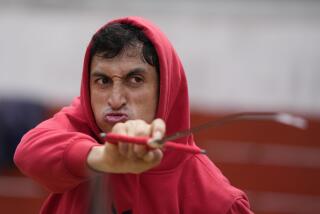Boxing, Once Banned in China, Coming Back
- Share via
BEIJING — Down an alleyway, lined with ancient houses, in a gym with no heat as the winds of winter swirl outside, Liu Xingjun jumps rope and thinks about world heavyweight champion Mike Tyson.
“He’s my hero,” the 18-year-old boxer said, steam and sweat pouring from his face. “I have his pictures all over my wall. I hope one day to be able to battle like him.”
Nearby, Wang Yawei slams his fists in a body bag.
The 26-year-old gave up a promising career as a kung-fu movie actor to fight fulltime.
“We’re just beginning to learn again how to box,” Wang said. “I wanted to be part of the change.”
Banned for 27 years because of safety concerns and politics, boxing is making a comeback in the People’s Republic of China.
In cities along the eastern coast, where the sport always was popular, boxing clubs are springing up and putting on competitions. Spectators by the thousands throng to these three-round events, crunching on sunflower seeds and sipping soft drinks, as boxers from one factory or another vie for purses worth about $20.
For the first time since the communist revolution in 1949, China sent a boxing team of two to the Summer Olympics last September in Seoul. One fighter was eliminated in his first match, while the other made it to the second round.
Another team is readying for fights in Indonesia in mid-February. And a bigger group of fighters is looking forward to the Asia Games in 1990, to be held in Beijing.
“But we still have far to go,” said Wang Guojun, the 57-year-old coach of China’s national team who once was the flyweight champion of China. “We don’t have any guys who’ve been fighting all their lives. Just a bunch of late starters.”
Wang had his boxing career cut short in 1959 when the government banned the sport.
“It was like waking up one morning and the golden horizon had disappeared,” he said. “Everything was black.”
The chain-smoking coach pulled out a photograph from his days in the ring--washboard stomach, arms like anvils.
“Look at that,” he said, sighing. “A pretty tough customer.”
For decades, boxing was popular in the coastal cities, a cultural import from Western imperialists who brought their sports as well as their products to China.
After the revolution in 1949, boxing continued its popularity in cities such as Qingdao, Shanghai, Hangzhou and Canton.
But a series of fighting accidents which left several Chinese boxers dead, and a push by the government to rid itself of “aggressive” influences from the West, led to boxing’s demise.
Wang took up soccer and hockey and began his wait.
“But students, athletes, all sorts of people kept coming to see me, and we’d always go a few rounds,” he said, doing a quick two-step while he cut the air with a right jab. “I always kept up hope that the ban would be lifted.”
In 1986, Wang’s dream came true and he was given the go-ahead to start a national team.
The decision was part of China’s push into the world of international sports to better its image and provide a source of national pride. Since 1980, Beijing’s athletes have broken more than 100 world records and won more than 1,000 titles.
For the most part, sports in China is the reserve of an athletic elite. Indoor swimming pools and wood basketball courts are off-limits to everyone but state-sponsored professional athletes. Gymnastic instruction is limited to those with a professional future.
Most Chinese get their excercise working on farms while others get theirs going to and from work on bicycles.
Wang’s boxing team is no exception. Promising members are borrowed from factories and sports institutes and brought to Beijing to be tutored under Wang’s watchful eye.
More to Read
Go beyond the scoreboard
Get the latest on L.A.'s teams in the daily Sports Report newsletter.
You may occasionally receive promotional content from the Los Angeles Times.










